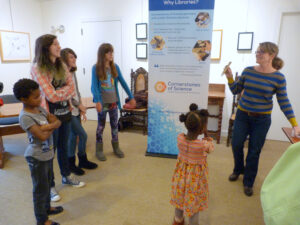
We have a long history of engaging underserved and underrepresented communities with STEM supports and we are excited to be seeking even better solutions for STEM diversity, equity, inclusion, and accessibility (DEIA). A few examples of our work in these areas include:
- Cornerstones of Science – Science Trunk Program supported libraries in rural communities with science activities and provided more urban communities with help reaching diverse families (2009-2020)
- Test the Waters science kit developed for Network of National Libraries of Medicine (NNLM) helps families learn about how water works in the body and how it reaches your house. It includes a citizens science component and is accessible for the visually impaired. Libraries should request the kit through NNLM today! (2019-2021)
- Cornerstones of Science’s Library Telescope Instruction Manual is offered en Español so that Latinx families can engage in viewing and enjoying the wonders of the night sky through this program. (2017-2021)
- Rev Up the Fun science activities help all families gain access to STEM online using readily available items at home. Available at revupthefun.org and through a pilot project at specific Maine food distribution sites in the summer and fall. (2020 -2021)
In the near future, we will be developing The STEM Equity Framework that will provide the basis for a cohesive and accessible professional development training series on the process and approaches specifically for library directors, community engagement and key front line staff. The STEM Equity Framework and online training series will strengthen library leadership and staff capacities to intentionally and collaboratively develop and implement an inclusive approach to engaging all stakeholders in the community. This includes engaging underserved/underrepresented groups, local, county, and state government agencies, and other community organizations in the design and delivery of equitable library services that address priority science-based community issues. In short, the intent is for library leadership and staff to position their libraries to successfully serve as a critical STEM equity asset for their communities.
Here’s a great free resource available to library staff that we recently came across:
Project Ready “hosts a series of free, online professional development modules for school and public youth services librarians, library administrators, and others interested in improving their knowledge about race and racism, racial equity, and culturally sustaining pedagogy.” Project Ready is available at https://ready.web.unc.edu/


